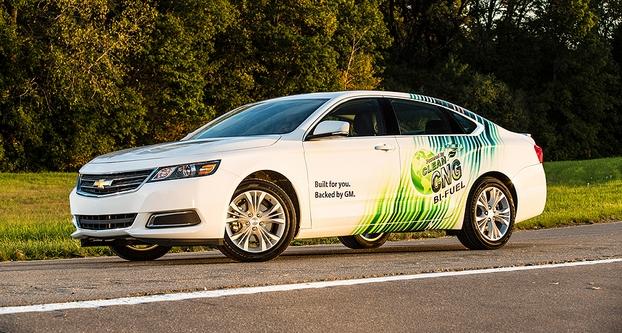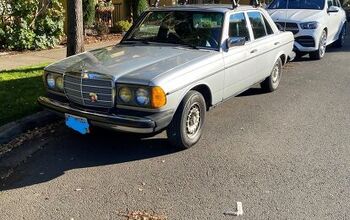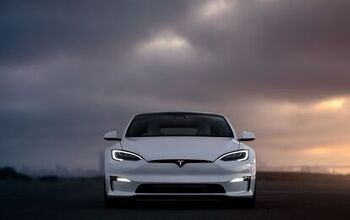Chevrolet To Offer CNG-Powered Impala
Looking to take advantage of the natural gas boom currently occurring in America, Chevrolet will market a bi-fuel version of its Impala sedan starting next year.
With the ability to run on either gasoline or CNG, the Impala will be offered primarily to fleet customers starting in the summer of 2014. The CNG Impala will be offered as a 2015 model, with Chevrolet only expecting to move 750 to 1,000 units. The car will have a second tank for CNG in the trunk and should offer a combined range of 500 miles. GM CEO Dan Akerson was vague about the price premium for the car, suggesting it could be at least “a couple thousand” dollars. Other vehicles, like the Honda Civic and Ford F-150, carry premiums ranging from $3,000 to $7,500 for the CNG option.
Other auto makers such as Chrysler and Volkswagen have expressed interest in CNG. Chrysler offers a CNG powered Ram 2500 pickup, but lack of demand, as well as infrastructure, have been cited as potential stumbling blocks.
More by TTAC Staff


































Comments
Join the conversation
Due to a freak convergence of geology and luck, my family homeplace and eventual retirement ranch is situated over about eight oil and gas sands that have been exploited beginning about 1895 and there has been drilling or other development activity every 20-40 years since. Some oil, more gas. Most recent well is in the Marcellus shale, drilled in 2006. I don't worry much about running out since one of the more productive gas wells is 40 years old. The 110-year old wells produce gas rich in gasoline vapor--it can literally be distilled from the gas. The leases, also conveniently 110 years old, allow for domestic use. So a bi-fuel vehicle would make a lot of sense. I have only recently started looking into this, and one concern I have is that the raw natural gas also has butane, propane, and any number of other hydrocarbon gases that are stripped out of commercially distributed natural gas. It ain't just CH4. Curious if the fuel delivery system of these new CNG bi-fuel vehicles takes into account differing qualities (i.e., BTU values) of various commercially available gases, or if they're close enough to each other that the system wouldn't be flexible enough for casinghead gas.
Well, you CAN run a motor vehicle using CNG. One must appreciate that it will always be a niche product for a number of reasons. My addition to this thread is to point out that natural gas and oil compete in many different markets, and CNG as motor fuel is actually one where natural gas is at a considerable disadvantage. Fracking has recently broken the price of natural gas in the US by half. Fracking is now in the process of breaking oil prices, many say it will be by 30%. I think it might turn out to be even a little more than that. CNG as a motor fuel has to be considerably cheaper than gasoline/diesel to make it economically viable even as a niche player. Six months ago the pump price ratio in the USA was about 2 to one. Now it is down to about 3 to 2, it is trending down, and you ain't seen nuthin' yet, imho. At the peak of the 1980's oil crisis New Zealand (which had, at the time, one recently discovered big gas field, but no domestic oil production) had 110,000 CNG powered motor vehicles - about 10% of their fleet. Now they have 200. Not 200,000, 200. A few countries without much oil, but some natural gas, have emphasized CNG powered motor vehicles. Pakistan, Argentina, Brazil, and to a lesser extent China. Iran has also done so in order to make more oil available for export. The total global fleet of CNG powered motor vehicles is about 15 million light vehicles and 2 million trucks, mostly in the aforementioned countries. Pakistan is rethinking CNG for motor vehicles because they need their natural gas for industry. Many truck stops in Texas and points west have installed CNG fueling stations, but they are hesitating incurring the expense of activating them until they see how things play out. Personally, I like the idea of CNG as a motor fuel. I also like Boone Pickens, although I know him only slightly, he has always seemed like a nice man. The odds on CNG as a motor fuel turning out to being a winner? Don't bet the farm on it.
Honda hasn't manufactured a CNG Civic since pretty much last February. I think production for the year is in the low 300s and won't begin production again until this February. The reason for this is simple, almost all of the CNG Civic sales went to the government. With the "buy america" program it was determined that cng civic did not have enough domestic source content to qualify. This is likely the arena that the Imp is going after. Honda only sold the refill station in Oklahoma and California (I think it's those two states), in most other states domestic sources of natural gas have too much moisture content, possibly leading to engine damage.
@Pch101 Again, Pch101 I'll have to educate you on how the big wide world works outside of the backwater existence you lead. Seriously, have a read of the attached document. You will learn and you will see that the UNECE regulations leaves plenty of scope for individual nations to exercise considerable scope on how to manage UNECE regs. The options that Australia looked at are wide ranging from continuing on using our Australian Design Regs, which costs a considerable amount to maintain to adopting a complete 'takeover' of UNECE design regulations. This working document was completed by our Federal Finance Dept. It covers all bases on the pros and cons of adopting UNECE regs. As you can assess by the branch of government it is looking at the costs to the nation of adopting UNECE regs. Do read it. Like I stated the US should use this system, its flexible. Read and learn Pch, maybe one day you can have a discussion with me at my level. http://ris.finance.gov.au/files/2012/03/03-Harmonisation-of-the-ADRs-RIS.pdf